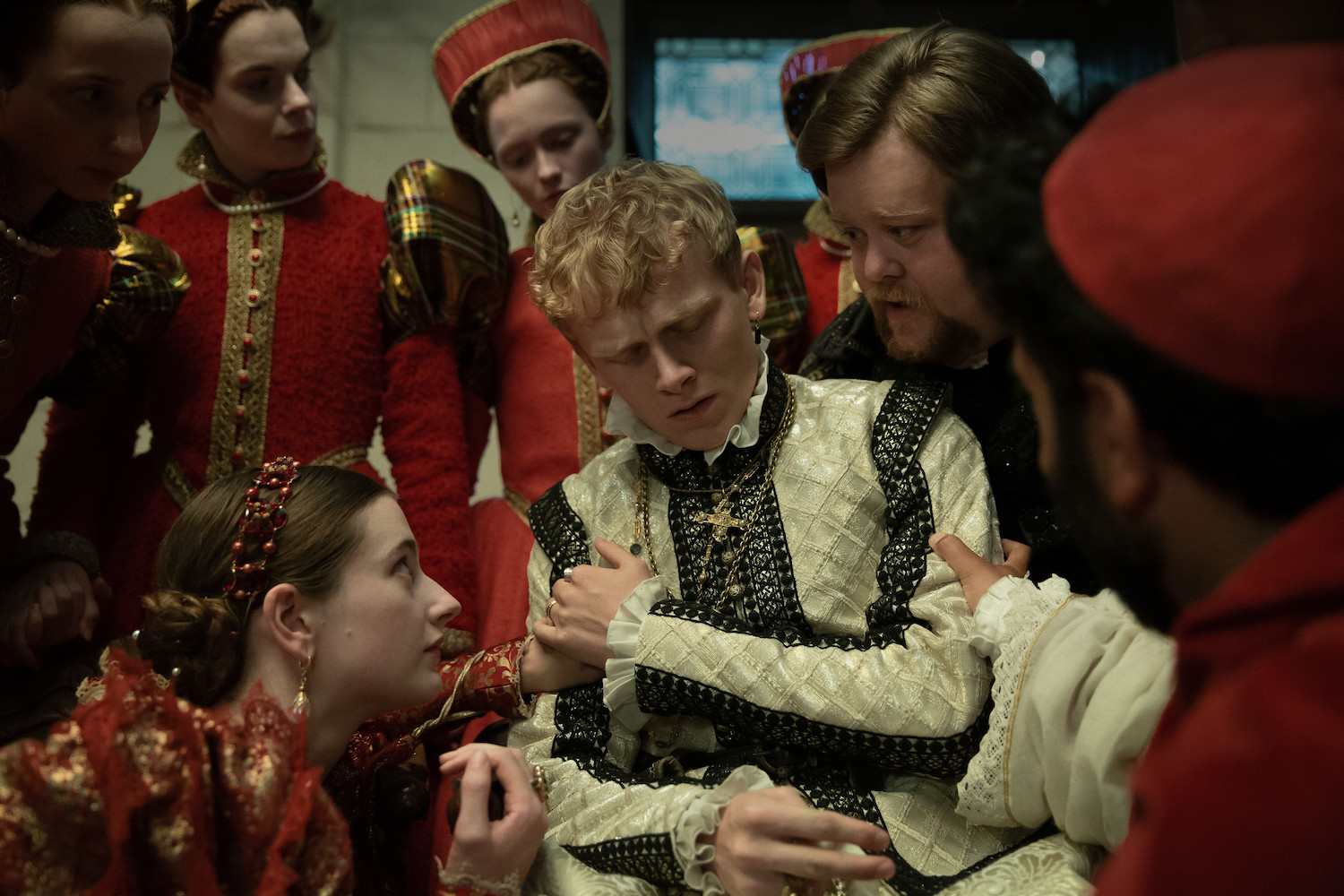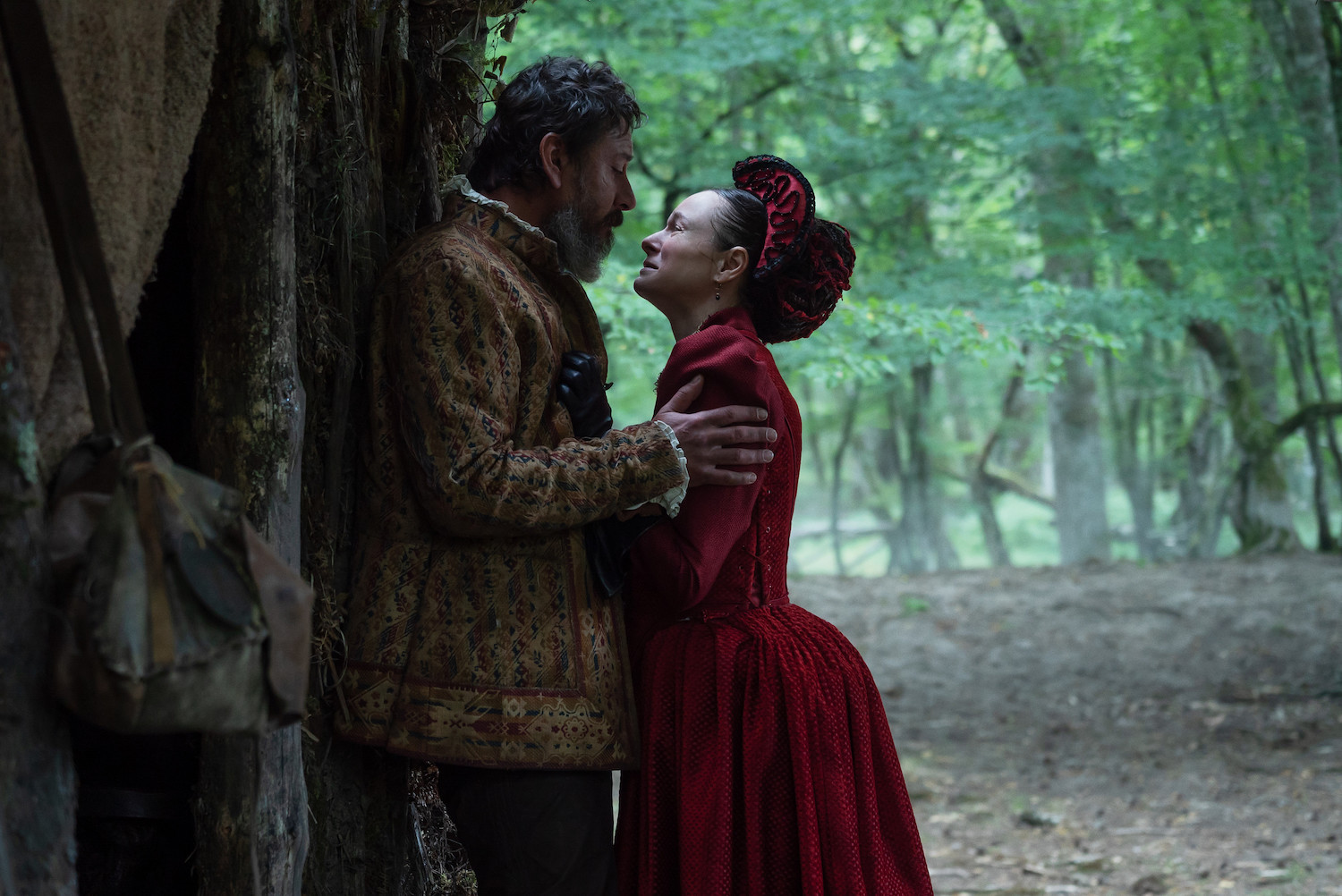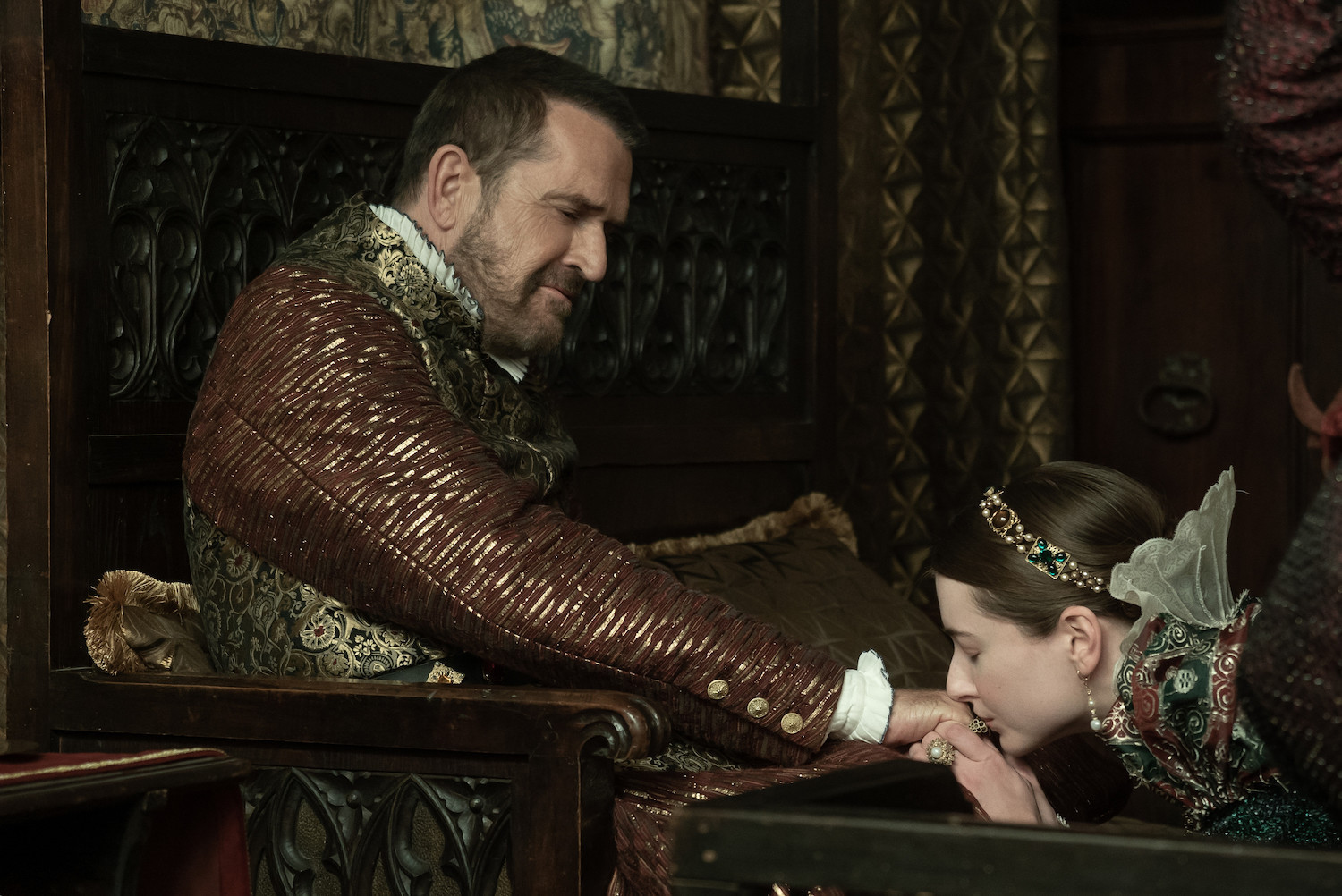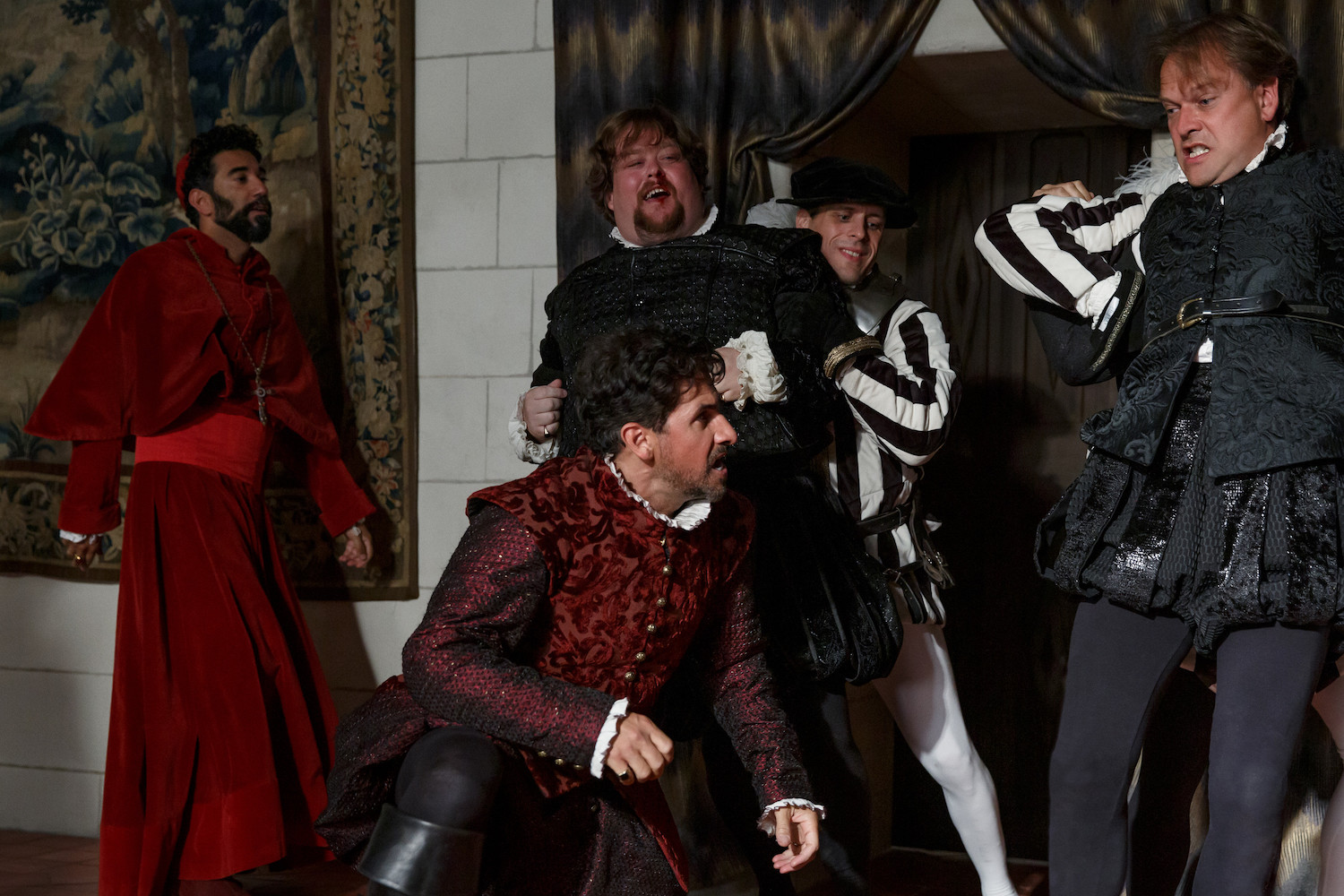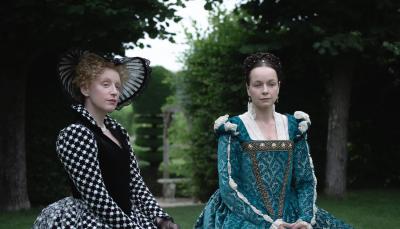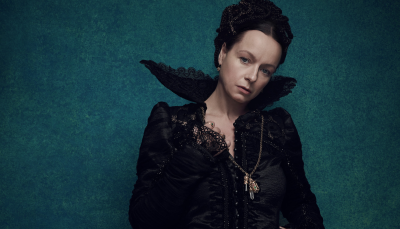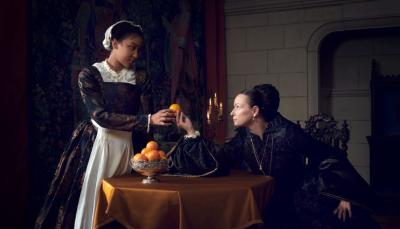'The Serpent Queen's Seventh Episode Reveals "An Attack on the King"
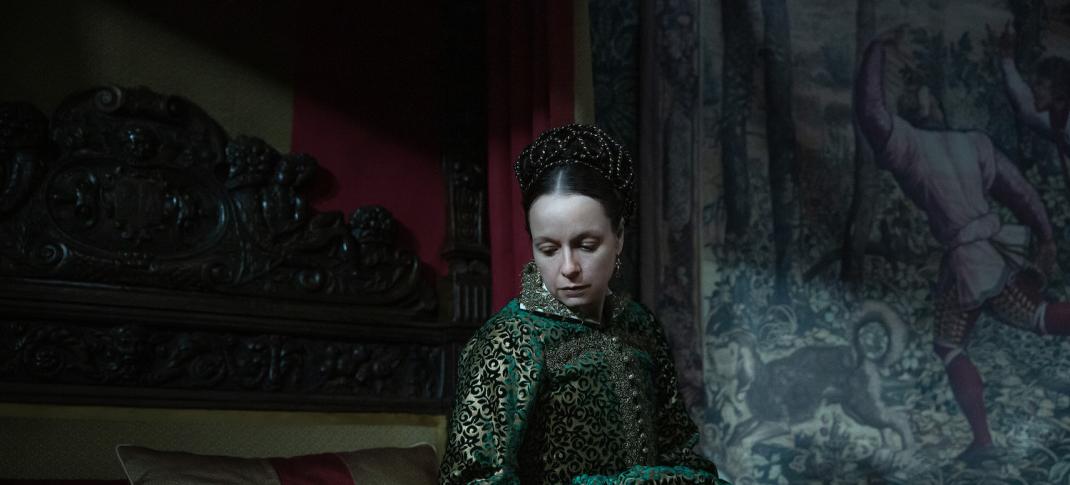
Catherine (Samantha Morton) grieves for her husband the King.
© 2021 Starz Entertainment, LLC
It’s the penultimate episode of The Serpent Queen, and Catherine’s narration of events has almost caught us up to the present. However, we start with a different point of view in this episode when Rahima, still imprisoned, receives a visit from Mary Stuart de Guise, there to recruit her. Mary becomes the narrator, going back to her fateful wedding day. King Henri has been felled by his jousting opponent. Is he dead? He’s certainly close to death, with a gruesome injury, his opponent’s lance in his eye. (Warning: This episode contains some unpleasant material.)
Catherine: “You have learned a valuable lesson. A Queen never lacks a legitimate reason to break a promise.”
In a diversion from her prophetic dream, Catherine does not allow Diane de Poitiers into the royal apartment. Emboldened by impending death, Henri speaks his mind when Catherine asks him why he did not comply with her request to stop jousting. Cruelly, he tells her he wanted to make her dream come true; when she says she loves him, he responds that he pities her.
The family gathers to take stock and pray; everyone behaves well for about five minutes. The Holy Roman Emperor leads the prayers, and even the feelings of the Protestant Bourbon Bros are considered. “Today we’re all Frenchmen first,” Louis announces, although seconds later refuses to kneel. After that, the Holy Roman Emperor gets down to business, proposing an alliance to secure the English throne for Mary should proceed under the new King Francis.
The lance cannot be removed from Henri’s eye, and Francis, not ready to be King yet, is devastated. With most of the others busy consoling Mary and Francis, the Dowager Queen Eleanor attacks her brother for attempting to destroy her family. “That’s what families do,” the Holy Roman Emperor says, smirking. “Bit by bit and no one gets out alive.” Diane offers some help of a more practical nature, taking the doctor into the dungeon. There are three criminals to use as practice material for a stake-in-the-eye removal. The first attempt kills the man outright, but Diane isn’t deterred and orders them to move on to the next.
Catherine dreams of when she and Henri met, only to be awoken by music and revelry. Henri, minus the stake, is seated at the wedding feast; Diane welcomes the horrified Catherine to join the celebrations for the King’s miraculous recovery. Upon seeing her, Henri hemorrhages and collapses. Diane refuses to believe he has died, begging for help. Catherine tells her the King is dead and leaves with great dignity. “Don’t look so glum,” the Holy Roman Emperor tells Charles de Guise, “your ship’s just come in.”
Catherine visits her magician, Ruggieri, furious that Henri is dead. She had chosen to keep him alive, so why did he die? It’s an intimate and passionate scene, as Ruggieri tells her Henri made his choice and gives her a brew made from –– ugh –– the King’s heart, which the embalmers had discarded. Drink it, Ruggieri tells her. “You will be his living tomb.” (Ugh, I say. Ugh!) As she does, Diane is (finally!) leaving court, accompanied by Angelica. Aabis and Mathilde watch as she goes, Aabis in tears and taking comfort from her apprentice, who adores her.
An audience of a different sort occurs between the Holy Roman Emperor and Mary, a feast of avuncular unctuousness and girlish simpering. The new king is overcome with grief, she tells him. The Emperor tells her since Francis is out of commission, it’s God’s will that Europe should be united, under the one true faith, with Mary at its head. The Privy Council members can’t object; they would be opposing the Church. However, Antoinette de Guise, who has been schtupping a Bourbon bro, breaks it off, knowing Protestants will soon be in trouble
For the funeral, Catherine wears black, even though white is the traditional color for mourning. The Holy Roman Emperor propositions Catherine over her dead husband’s casket. (Funerals apparently turn him on.) Mathilde, ever plain-spoken, advises Catherine to ditch Ruggieri because he encourages the darker side of Catherine’s nature. “The darker parts of my nature will ensure my survival –– and yours,” Catherine tells her. “Bit too soon to tell,” Mathilde answers. Sure enough, Mathilde is visited by Mary, her entourage, and their best Stepford Wives imitation. Mary promises Mathilde will be safe if she gives them information.
At a tumultuous Privy Council meeting, cans of worms are opened. The Bourbons discover an edict will be issued making Protestantism illegal in France. Catherine warns Francis the Holy Roman Emperor is not to be trusted; Montmorency agrees. Francis counters Catherine never cared about him, so why start now? Mary, smirking piously, offers the Bourbons to convert, and the meeting deteriorates into a brawl. As the guards throw him and his brother out, Antoine can’t resist telling the Guises Bros he (ahem)ed their mother.
The Protestant purge begins, and Aabis’ apprentice is arrested; she turns to Catherine for help. Catherine has seen bodies of Protestants hanging in the forest but wants to know why Aabis is so concerned about her apprentice; she can find another. Aabis replies he has no one else in the world. Following Mary’s visit and threat, Mathilde also speaks to Catherine. She asks for her freedom and urges Catherine to leave the court and live in peace away from the power plays. But she knows Catherine will not, or cannot, relinquish her role. Mathilde, the ultimate survivor, will have to fend for herself.
It turns out Montmorency has joined a Protestant sect; his transformation is partly because of the young woman he took away from her father. Catherine wants him on her side; his condition is the girl, and his congregation is kept safe. As for those other Protestants, the Bourbon Bros, they've gone home where their father, the Duke, is not pleased to see them. They had one job, and they failed it. (“Sorry, daddy.”) Why don’t they go to Navarre? Antoine is the King of Navarre, officially Protestant, and has a wife. Neither he nor Louis are interested. (No music, no wine, lousy food, etc.)
Catherine and Montmorency show up with a proposition: In return for their help, they will be awarded a place in Catherine’s court. As the Duke says, the plan is either profoundly stupid or inspired. Catherine will arrange a trip through the forest, with minimal security, during which Francis will be kidnapped. The young King will be exposed to Protestants and convinced of their worth, and initiate a change of policy. What could possibly go wrong?
At the next Privy Council, Mary declares a sect of Protestants nearby must be rooted out and made an example of, demonstrating the King’s commitment. However, the frail King Francis is not up to leading, and the Guise Bros argue hanging too many peasants could lead to trouble. Mary, sensitive to any criticism of her husband, goes on the attack against the Guise Bros, threatening them until they agree to support her plan. To Mary’s surprise, Catherine also agrees, as we cut to Montmorency leading the group away from their church. Mathilde watches, but will she be reporting to Mary or Catherine?
As the train of coaches enters the forest, the Guise Bros bicker, Francois jealous of his brother’s growing influence. Meanwhile, in the carriage with her son and Mary, Catherine asks him if he’ll reconsider the alliance with the Holy Roman Emperor, who cannot be trusted to supply the troops he promised. She’s concerned about what will happen to him.
Francis blows up, accusing her of being cold to him and his father, and wonders if he was born afflicted because of the blackness of her heart. As usual, becoming emotional, he becomes short of breath and coughs up blood. Ahead of them on the road is a wagon with a broken wheel, and armed men lurk at the side of the road.
Back in the present, Mary tells Rahima that she believes Catherine is responsible for what happened to Francis and makes her pitch. She expects Rahima to shift her loyalty from Catherine and asks her to find her letter from Queen Elizabeth, which she believes Catherine now has. Rahima agrees and returns to Catherine’s room, where she quickly finds the letter.
When Catherine arrives, Rahima tells her this; plus, she told Mary a pack of lies about Catherine and was released with the gift of the dress she’s now wearing. Catherine is amused and expresses concern that Rahima may be angry with her. (Of course not!) They assure each other their friendship is unbroken. “You have learned a valuable lesson,” Catherine tells her.
We’ll have to wait until next week when the final airs to see how badly the kidnap of the King goes and where Rahima’s loyalty lies.

